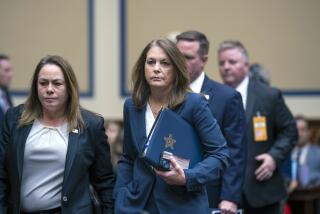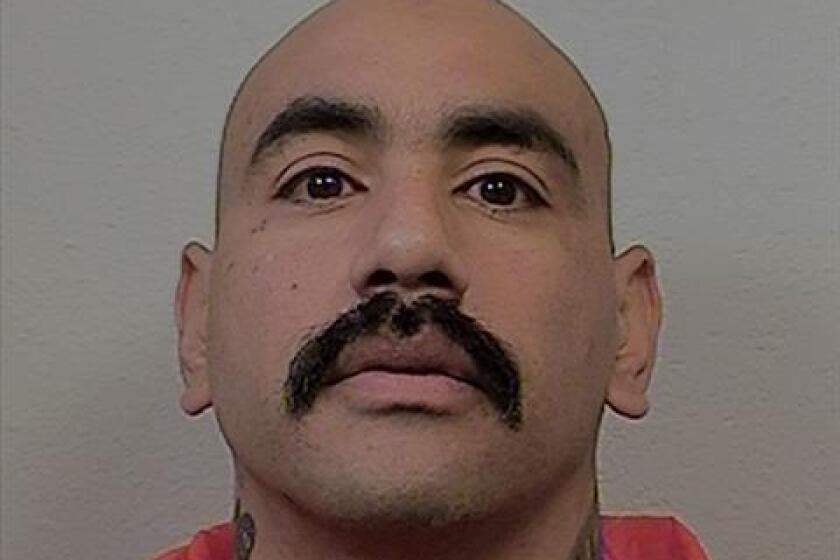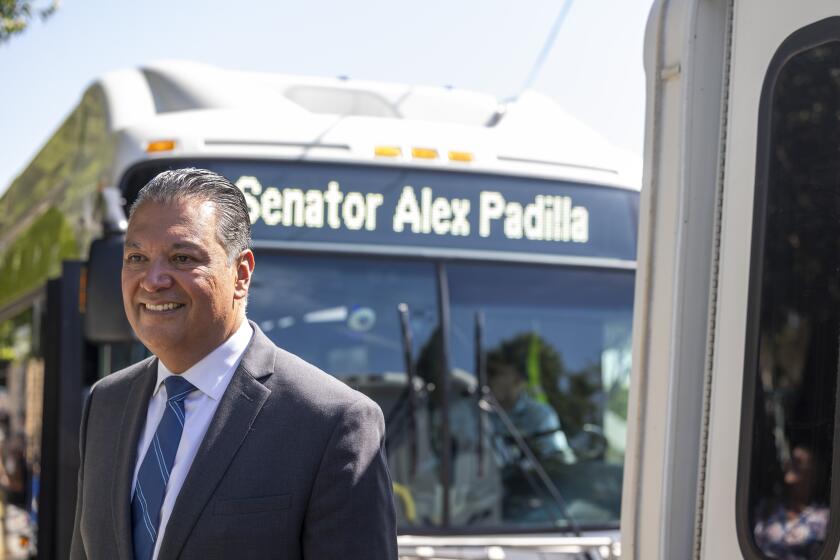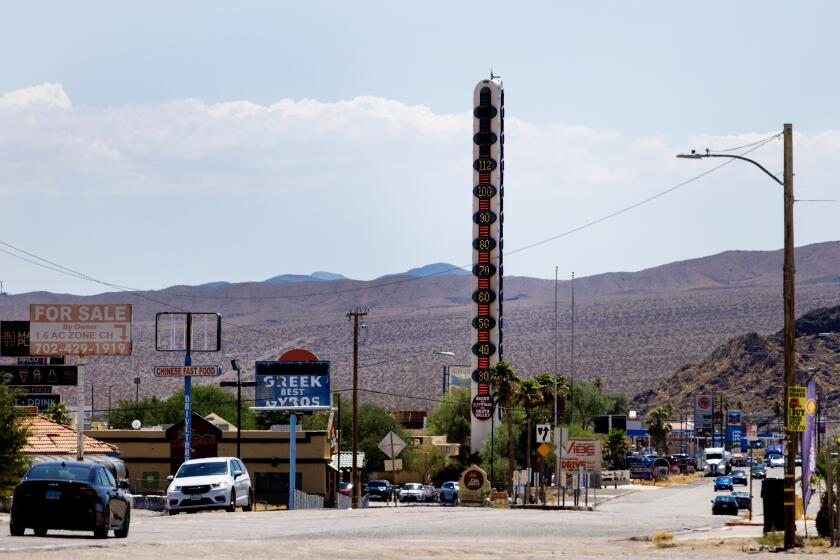Speaking Their Peace : Stoked by a Spiritual Fire That Grew Into Political Activism, Blase and Theresa Bonpane Have Dedicated Their Lives to Justice for the Poor
Housed among the da Vinci folios and Napoleon Bonaparte’s hat in the UCLA library’s special collections repository is a 94-box archive donated by activist Blase Bonpane: appointment books, reel-to-reel tapes, newspaper clippings and hundreds of personal letters. If Bonpane said or wrote something, UCLA wanted a record of it.
Perhaps the most enlightening materials, however, are those that document his surveillance by the U.S. government. From 1967 through the mid-’80s, the FBI, CIA or some other government agency witnessed or kept track of nearly all of Bonpane’s public appearances. And, judging from the casework, a few of his private events as well.
There was, after all, a lot to witness.
Such as December 1969, when, responding to a plea from the Black Panthers, he talked the police into holding fire long enough to let a group of Panthers holed up in South-Central Los Angeles surrender. (That performance, he says, made the local news, costing him a teaching job.)
Or the two years the then-newly wed Bonpane and wife Theresa (both former missionaries with the Catholic Maryknoll order) spent at the United Farm Workers headquarters near Tehachapi. There they earned a combined $10 a week publishing a newspaper and running a graphic arts workshop for migrant workers.
Then there were the trips to Cuba. Bonpane, always happy to meet a fellow American, once introduced himself to the G-man sent there to tail him.
Still another report noted, with alarm, that Blase had long admired Abraham Lincoln.
At last count, government agencies had compiled several hundred pages of information on the Bonpanes, a number that rivals similar files on big-time cocaine smugglers and other ne’er-do-wells.
But then, to some people, the Bonpanes were trafficking in something far more dangerous than organized crime or drugs.
They were working for peace.
*
Office of the Americas, the nonprofit educational group the Bonpanes have directed since its founding 13 years ago, is housed on the second floor of a building known as the Peace Center along a funky stretch of 3rd Street in West Los Angeles.
It’s one of few grass-roots peace organizations to withstand the winds of political change. And it’s a strange paradox that keeps the group in business: If not for the continued suffering of the poor Latin Americans OOA has been helping through the years, the Bonpanes might too be out of business.
“We’d always love to work ourselves out of a job,” says Blase, 66. “I doubt if it would ever happen in my lifetime, but it’s certainly a goal. . . . The last thing we’d want to do is to have the problems continue.”
OOA has an annual budget of about $100,000--which comes from donations, OOA members and special fund-raising events. It delivers little in material aid to the countries it emphasizes--Mexico, Cuba, Guatemala, El Salvador and Nicaragua. Instead, its mission statement dedicates it to “furthering the cause of justice and peace in the hemisphere through broad-based educational programs.”
Toward that end, OOA has helped bring a long parade of Latin American leaders--former Nicaraguan President Daniel Ortega; Miguel d’Escoto and Ernesto Cardenal, former cabinet-level ministers in Ortega’s Sandinista government; Salvadoran rebel leader Ruben Zamora; and Nobel Peace Prize winner Rigoberta Menchu--to this country, where they have appeared on college campuses and in other forums to talk about the effect of U.S. policies on their countries.
The Bonpanes have also led dozens of delegations and thousands of American citizens to areas of conflict in Mexico and Nicaragua. Blase also tapes up to a dozen radio and television programs a month--most for public-access cable channels or small public radio stations--and will speak before any gathering with a microphone.
With his barrel chest and bald pate, and dressed in a sharp suit and tie, Bonpane is a slightly taller version of actor Ed Asner. That seems fitting since Asner is one of the many celebrities who have actively supported the Bonpanes’ work through the years. Casey Kasem, Martin Sheen, Kris Kristofferson and Richard Masur, among others, have worked or traveled with Bonpane, while writer / directors Oliver Stone and Gregory Nava used him as a resource in making the films “Salvador” and “El Notre,” respectively.
But Blase hasn’t confined his pedagogy to well-known personalities. He’s spent much of his life in a classroom and still teaches a class in political science at East Los Angeles College, following earlier stints at Cal State Los Angeles, UCLA and Cal State Northridge.
That teaching stipend represents an important part of the Bonpanes’ household budget. While both Theresa and Blase draw small salaries from OOA, as recently as three years ago they had to go on unemployment to keep the office and its education programs going.
“His calling is to make sure that people are educated,” says filmmaker Haskell Wexler, an OOA board member. “Somehow to bring something other than the official viewpoint to people. Not so much to tell them what to do, but to say ‘Look, this is what we see going on. Now think about that.’ ”
*
Shortly after Blase Bonpane was ordained as a priest with the Maryknoll Order in 1958, the Catholic Church underwent a fundamental change. After a flurry of early ‘60s papal encyclicals committed the church to a “preferential option for the poor,” it was no longer enough to simply give bread to the poor; now the church would question why the poor had no bread in the first place.
So when Maryknoll sent Bonpane to Guatemala in 1966, it was with a specific, albeit provocative, agenda. He was told, he enjoys recalling, “to start a revolution.”
A priest who had come to the seminary from the Marine Corps, Bonpane was a strange choice. A former high school boxing champion and onetime USC football prospect who included then-Vice President Richard Nixon on the guest list for his ordination, Bonpane followed a conservative religious doctrine and knew little about the political turmoil then engulfing Latin America.
Soon, however, he was irrevocably involved. Weeks after arriving, while working in a primitive village in the highlands of Huehuetenango, Bonpane wrote in his diary: “I do not intend to become accustomed to the poverty and destitution of these poor people. I do not intend to become accustomed to their sickness, ignorance, to the constant injustices they receive. I do intend to do whatever I can to change these evils.”
Rather than baptizing infants, Bonpane began having them vaccinated. Instead of feeding the poor, he helped organize them. His personal conversion was complete--and it would come to change his life.
But those ideas unsettled the Guatemalan government. In December 1967, it accused Bonpane of “plotting an armed revolution” and, after his office was firebombed by a group he believes worked for the government, he was expelled from the country.
Maryknoll assigned him to a parish in Hawaii with strict orders not to discuss Guatemala. But after 12 hours of soul-searching in Honolulu, he grabbed a flight for Washington. Less than a week later, the Washington Post published his commentary that likened the status quo in Guatemala “to a condition of mass murder.”
In response, Maryknoll expelled him from the order. In less than four months, Bonpane had been evicted from a country and a religious community.
“There was nothing else I could do,” Bonpane says of speaking out. “That was what I had to do.”
A few months earlier and several thousand miles to the south, another Maryknoll missioner had also separated from the order.
But Theresa Killeen left of her own accord. After 12 years as a nun--the last two as principal of a high school in southern Chile--Killeen worked up the courage to tell her superiors what some of them had already suspected: She never wanted to be a nun in the first place. So she left South America for Southern California with $100 in cash and a nascent political awareness that would soon dominate her life.
Like Blase, Theresa had gone to Latin America with a conservative political philosophy. “If I veered in any direction it was more toward being sort of establishment,” she remembers.
“My work among the poor there . . . led me into being very political because I kept falling into this thing of no matter what I did, the system was against the poor.”
In Los Angeles, she quickly began searching for any group directed toward peace and justice. She marched against the war in Vietnam and in support of striking farm workers. It wasn’t long before her liberal activism brought her into contact with Blase.
Encouraged by mutual friends, they eventually began dating and on New Year’s Day 1970, they were married. The news overwhelmed Blase’s father, a Superior Court judge and a onetime Republican candidate for Congress who had moved his family from Cleveland to Los Angeles when Blase was 8. He had always wanted grandchildren much more than he wanted a priest in the family, and the grandchildren were quick in coming--Colleen was born that December and Blase Jr. two years later.
Soon, the Bonpanes were mixing peace demonstrations with Little League games, Indian Maiden meetings and soccer practice.
“My gut feeling would be today that there is no spiritual path more profound than trying to be a good parent,” Blase says.
“I think that is the most sanctifying thing in the world because if you are a good parent, then the kid makes you a good person and brings you up properly.”
*
By the time U.S. planes began the Persian Gulf War’s initial bombing runs over Iraq, a solid majority of the American public had lined up behind the war. The Bonpanes, not surprisingly, were not among them. So while the first fires in Baghdad were still burning, they joined a crowd of 2,000 protesters in front of the Federal Building in downtown Los Angeles.
What began as a boisterous but orderly rally turned to chaos when a group of demonstrators broke through a phalanx of federal protective officers and sat down inside the building’s lobby. The officers reacted forcefully, striking a number of protesters--including Blase--with clubs.
“We’re trying to protest peaceably,” he said then, “and we’re getting the hell beaten out of us.”
Eventually 158 demonstrators--including Blase and Theresa--were handcuffed and forced to lie face down in the lobby. They had been there before, of course; although they both dislike the strategy and consider nonviolent civil disobedience something of a last resort, the Bonpanes have been arrested many times.
This time, however, there was a difference. When the dust cleared, they saw their son, on semester break from classes at UC Berkeley, lying on the floor a few feet away.
“He looked over and said, ‘Hi, Mom. Hi, Dad,’ ” Blase remembers.
“The idea of social responsibility was kind of a core of family life,” says Blase Jr., 23, who recently received a degree in peace and conflict studies. “I don’t think a lot of kids would come home after a day of skateboarding to a house full of boxes of medical supplies for Central America. My parents would ask that me and my friends put down our skateboards and help sort the boxes out. After awhile, we really started to get into it.”
As a child, Blase Jr. once chastised his parents for funding some home improvements rather than sending the money to El Salvador. At Berkeley, he wrote an honors thesis on the cooperative movement in the Nicaraguan revolution.
“I’ve certainly decided my life will be one of social service,” says the younger Blase, whose tongue-in-cheek voice-mail recording alerts callers that he’s run off to join Patrick J. Buchanan’s presidential campaign.
Colleen, 25, who works at UCLA’s medical research lab while awaiting admission into medical school, also remembers a childhood dominated by politics. At the same time, she says, “I remember when I was in junior high. . . . I said, ‘Yeah, I think what you guys do is great, but that’s not what I want to do with my life.’ I’m really not pursuing a politically active career.”
Still, she says, “I think that I’ve internalized a lot of the values [my parents] have in terms of, you know, serving underserved populations and caring for people.”
*
Blase Bonpane had never seen Wally George’s cable television program, and as he watched from backstage while the caustic, conservative talk show host devoured the first liberal sacrifice of the evening, he vowed never to watch it again. But it was too late to back out now. The U.S. had just invaded Grenada and Bonpane was invited to speak against the war.
When his segment began, Bonpane ignored his host and spoke directly to the audience. Incensed, George left his seat and physically confronted his guest. “I saw his empty desk and the image of Jesus in the temple with the money-changers flashed through my mind,” Bonpane recalls. “So I flipped it over and walked off the stage.”
It was the furniture toss heard--and seen--around the world. News programs aired the clip repeatedly and George soon developed a national reputation.
The occasional flash of anger aside, flipping furniture is not Bonpane’s style. While activist groups of all political stripes are full of iconoclasts spouting dogmatic rhetoric, OOA has worked hard to maintain a warm, welcoming atmosphere despite the deadly serious nature of its work.
“I was amazed by the sense of family here,” marveled one volunteer. That feeling comes from a gentle spirituality that pervades their work, friends of the Bonpanes say, though it’s no longer a spirituality that can be attributed to a particular religion. Both Blase, who devoted 18 years of his life to the Catholic Church, and Theresa say they now attend Mass infrequently and admit they’ve come to reject certain core tenets of the faith.
“I decided that my spirituality was not as a Catholic, but just as a person who is involved in wanting to make this world a better place,” Theresa says. “I really feel if there is a God that I’m just going to get along fine with him.”
Adds Blase: “Faith for me is more a matter of what we do, what our conduct is. And I think scripturally that’s what faith is about. When Paul speaks about faith, he’s talking about what people did, their willingness to take risks.”
Such interpretations of Scripture have come to be collectively known as the Theology of Liberation. Bonpane wrote a book, “Guerrillas of Peace” (South End Press, 1985), and his doctoral dissertation on the impact of liberation theology in the Central American revolution, and he remains a vocal proponent of it. But many, including the current pope, disagree with his interpretation of the gospels.
“He’s neither naive nor misguided. He’s simply wrong about what works,” says conservative commentator Hugh Hewitt of KCET-TV’s “Life and Times.”
Hewitt has devoted numerous segments of his popular KFI radio show to scriptural themes. He’s also debated Bonpane at least twice, encounters that left him believing Bonpane to be an “intellectual, committed, sincere and obviously kindhearted fellow” who is, nevertheless, “just plain wrong.”
*
Blase Bonpane knows rejection in the secular world as well. Twice he has lost bids for Congress, and he failed to win elections for a school board and state Assembly.
Still, he won’t rule out another run: “I’d love to work for government--on my terms. I do believe in getting into the real political situation, as horrible as it is.”
But Theresa, 61, jumps in with a dose of fatalism: “It’s just that you don’t have a chance, obviously.”
Twenty-six years of marriage and a working relationship has produced a seamless quality about the Bonpanes’ relationship. During an extended conversation in the sun-splashed living room of their Santa Monica home, Blase frequently starts a sentence, then pauses for a moment, only to see Theresa finish the thought. Which is not to say they always think alike; during the same afternoon they sparred energetically on a number of topics.
It’s just that kind of intellectual challenge that has made their relationship successful. Their work, in fact, depends upon it. While Blase spends much of his time in the public eye, lecturing and debating, Theresa focuses on the bottom line, coordinating OOA’s 40 volunteers, mailing newsletters and handling dozen of other details that keeps the operation running.
She also edits everything Blase writes, and that frequently frustrates him. “She challenges almost everything I write,” he says. “But you know what? When I’m done, it’s much better. It’s the school marm in her.”
Indeed, Theresa, a Troy, N.Y., native, has spent much of her professional life as an educator--from Latin America to a number of high schools and colleges in Southern California, where she primarily taught English as a second language.
And although her vision of justice is far off in the horizon, her work--whether leading a delegation to Nicaragua, organizing an educational forum for OOA or volunteering weekly with the homeless at both St. Joseph’s Day Center and Turning Point shelter in Santa Monica--has made a difference.
“I think that a lot has been accomplished,” she says. “No. 1, I don’t think things are as bad as they were. . . . So maybe the results weren’t--and never will be--all that we want them to be. But what’s the alternative?”
(BEGIN TEXT OF INFOBOX / INFOGRAPHIC)
Blase and Theresa Bonpane
Ages: Blase, 66; Theresa, 61.
Background: Blase was born in Cleveland Heights, Ohio, but moved to Los Feliz in 1937, attending Loyola High and USC. Theresa was born and raised in Troy, N.Y. They live in Santa Monica and have two children, Colleen, 25, and Blase Jr., 23.
Hobbies: Blase enjoys boogie-boarding, hiking and reading. Theresa likes gardening and reading.
Blase on his standing as a priest: “The priesthood is like baptism. You can’t be a formerly baptized person. You can’t become unordained. You can be in bad standing. You can be in all kinds of bad standing. But when people say, ‘Did you used to be a priest?’ I say, ‘No, I am a priest.’ ”
Theresa on her volunteer work with the homeless: “I love being with them and working with them and being person-to-person. It’s more personally satisfying.”
Blase on activism: “Don’t wait for the perfect solution before acting or you will never do anything.”
Theresa on her philosophy of life: “The consistency of life is that we care for each person, we try to care for each person as we would for our son and daughter, brother and sister. Because they really are.”
More to Read
Sign up for Essential California
The most important California stories and recommendations in your inbox every morning.
You may occasionally receive promotional content from the Los Angeles Times.







